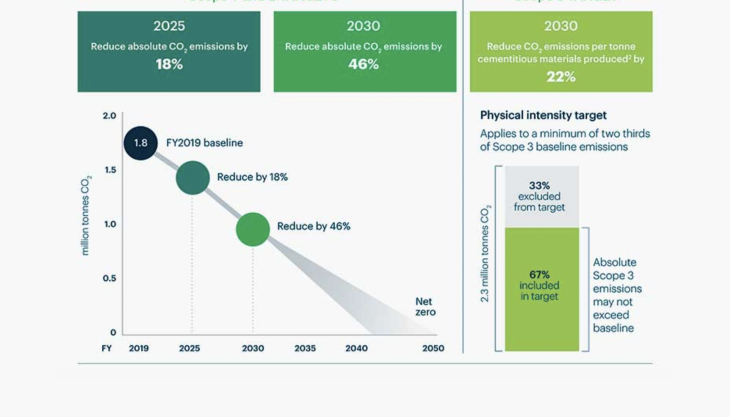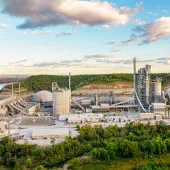
Company sets global sector-leading emissions-reduction targets and commits to net zero
BORAL have set the most ambitious emissions reduction targets in the global construction materials industry and have joined the Science Based Targets initiative (SBTi) Business Ambition for 1.5°C and UNFCCC Race to Zero.
The new carbon-reduction targets mean Boral are committed to net-zero emissions by no later than 2050, aligned with the most ambitious aim of the Paris Agreement to limit global warming to 1.5°C.
Boral’s 2030 targets, which it is seeking to be validated by SBTi, are a 46% reduction in absolute Scope 1 and 2 emissions, and a 22% reduction in relevant Scope 3 emissions per tonne of cementitious materials, from a 2019 baseline.
Boral’s chief executive officer and managing director, Zlatko Todorcevski, said: ‘As Australia’s largest integrated construction materials company, we have a unique opportunity to lead the way to make a meaningful contribution to build greener cities and create a net-zero future.
‘We are proud to be the first company in the cement sector to set science-based targets aligned with a 1.5°C pathway for Scope 1 and 2 emissions.
‘We are redefining Boral’s strategy to become a leading innovator in sustainability by decarbonizing our cement and other construction materials businesses and embedding a more circular economy approach. Our decarbonization pathways include shifting to renewable energy sources, and growing our proprietary lower-carbon, higher-performing concrete solutions.’
Boral have defined the five key decarbonization levers that underpin its climate targets:
- Energy: by transitioning to 100% renewable electricity, increasing the use of alternative fuels at their Berrima Cement kiln, and improving energy efficiency
- Cementitious intensity: by optimizing the energy efficiency of their Berrima Cement kiln and accelerating adoption of their lower-carbon concrete product range, including ENVISIA, Envirocrete and Envirocrete Plus
- Transport: by optimizing supply chain logistics and routes, and exploring alternative fuel fleet options
- Sourcing: by prioritizing lower-carbon-intensity suppliers
- CCUS: by exploring and testing emerging carbon capture, use and storage (CCUS) technologies.
Mr Todorcevski said Boral were making good progress already by investing in R&D and partnering to bolster their innovation efforts and access to leading technologies, as well as collaborating with customers and suppliers.
‘We are supporting our customers to make more sustainable choices, including by broadening our suite of lower-carbon concrete products and offering Climate Active-certified net-carbon-neutral concrete,’ he said.
‘Collectively, our decarbonization efforts aim to achieve carbon neutrality by no later than 2050 and deliver future growth by reshaping our business to be a leader through decarbonization.
‘We have a clear line of sight to deliver on our 2030 targets and beyond 2030, we are working on new and emerging technologies. Just how we achieve our 2050 ambitions will depend on further development and commercial viability of new and emerging technologies.
‘Our Innovation team is leading the way in developing high-performing sustainable products and solutions for our industry, including piloting carbon capture, storage and use technologies.
‘The team is supported by strategic partnerships, including with academia, government and through collaborative industry innovation hubs. By pursuing opportunities to re-define Boral through decarbonization, we are confident that we can support the ambition of our customers and Australia.’









